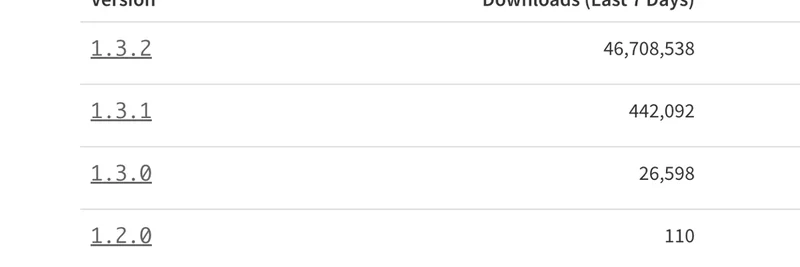Hey, blockchain builders and meme token enthusiasts – if you're knee-deep in developing DApps or tinkering with Ethereum-based projects, stop everything and check
🔍 Planning article content
- The X Post discusses a security issue in the npm package "error-ex" version 1.3.3, with malicious code targeting Ethereum.
your dependencies right now. A crypto commentator and macro analyst, MartyParty (@martypartymusic), just dropped a bombshell PSA on X about a sneaky supply chain attack lurking in the npm ecosystem. This isn't some distant threat; it's hitting a package that's downloaded millions of times weekly and could be siphoning your funds without a trace.
Let's break it down simply. The culprit? Version 1.3.3 of the error-ex package, a common JavaScript library for handling errors in Node.js projects. On the surface, it looks harmless – but dig into its code, and you'll find heavily obfuscated malware designed to detect Ethereum environments and steal your cryptocurrency. Think of it as a Trojan horse in your build pipeline, waiting to exfiltrate wallet data to an attacker's server.
That table above, shared in the tweet, paints a scary picture: In just the last seven days, v1.3.3 racked up over 442,000 downloads, while the safe v1.3.2 saw a whopping 46 million. That's a huge blast radius – from indie meme coin launchers to big DeFi protocols, anyone using React or other JS frameworks for their blockchain frontends could be exposed.
How did this get discovered? According to a detailed Substack post by a dev team that stumbled upon it, the alarm bells rang during a routine build. Their CI/CD pipeline threw a weird error: "fetch is not defined." Turns out, the malicious code was trying to make a network call to beam out stolen data, but their older Node.js setup didn't have the global fetch function, causing it to crash instead of silently succeeding. Peeling back the layers revealed obfuscated junk code hiding a telltale function called checkethereumw – a dead giveaway it's targeting EVM chains like Ethereum, Polygon, or even Solana if adapted.
The malware's goal? Spot if it's running in a crypto-savvy environment (like a DApp with web3.js or ethers.js) and then quietly harvest private keys or transaction data. In modern setups with newer Node.js, this could fly under the radar, potentially compromising thousands of projects. MartyParty's thread emphasizes it's Ethereum-specific but warns it could hit any EVM-compatible chain, urging devs to verify and rollback immediately.
The good news? It's fixable, and the exploited version has already been yanked from GitHub. But with 47 million weekly downloads for error-ex overall, the damage might already be done for some. Here's your action plan to meme-proof your stack:
Rollback ASAP: Pin your dependencies to
error-exv1.3.2. In yourpackage.json, add an overrides section like this:"overrides": {
"error-ex": "1.3.2"
}Then nuke your
node_modulesandpackage-lock.json, and runnpm installfresh.Secure Your Builds: Switch to
npm ciin your pipelines instead ofnpm install. It enforces the exact versions in your lockfile, blocking sneaky updates.Audit Like a Pro: Fire up
npm auditregularly, and integrate tools like Snyk or Dependabot for ongoing scans. Always review lockfile changes in PRs – if a transitive dependency bumps unexpectedly, flag it.Broader Lessons for Meme Token Devs: In the wild world of meme coins, where speed often trumps security, this is a wake-up call. Supply chain attacks like this (remember the SolarWinds hack?) can wipe out gains faster than a rug pull. If your project relies on JS for wallets or DEX interfaces, double-check everything. And hey, if you're building on EVM, consider auditing your entire dep tree – tools like
npm ls error-excan show if it's lurking.
MartyParty's alert has sparked a flurry of replies, from Solana devs breathing a sigh of relief (for now) to calls for npm to tighten its vetting. Check out the full thread here and dive deeper into the discovery at this Substack article. The error-ex NPM page now flags the issue too.
Stay vigilant, folks – in crypto, your code is your castle, and these npm gremlins are knocking. If you've been hit or spotted something fishy, drop it in the comments. Let's keep the meme economy secure one rollback at a time.



